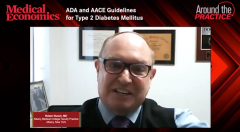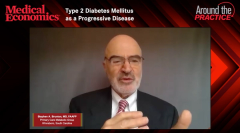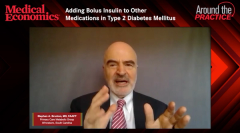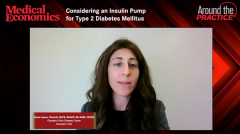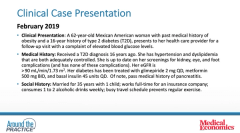
Patient Education on using an Insulin Pump
Episodes in this series

Dhiren Patel, PharmD, CDE, BC-ADM, BCACP: Bob, I’d love to learn from you and Steve. We don’t have Diana everywhere, so who provides this supportive care? Steve, you talked about how you’re fortunate enough to have the pump manufacturers come in. You can put them in a room and say, “Talk.” Bob, talk to me about the supportive care and the follow-up. Are you also giving your cell phone number to patients if they have pump questions? Does that go to the CDE [certified diabetes educator]? Does that go back to the pump trainer? Walk me through how you are all dealing with it in your practices.
Robert Busch, MD: We [at Albany Medical College Faculty Practice] are in a big group of 15 endocrine providers, and we’re spoiled that we have 4 educators. Our educators do the pumps, or the industry educators do that, as Stephen said. We have that. The patient will usually call me. At my visit with a pump patient, especially with a patient who has type 1 or type 2 diabetes, do they have their basal insulin in case they have pump failure. If they’re a patient with type 1 diabetes, do they have their ketone strips? What do they do for sick days and stuff like that?
That’s my role for them, but for most of the back-and-forth regarding the pump techniques, my educators know a lot more about that. I may know all the cardiovascular trials and the heart-smart drugs, but my educators are like what Diana does [at Cleveland Clinic Diabetes Center]. We have PharmDs as well, but because I have so many educators, they’re the ones doing it. The PharmDs learn it from them, and they then go out and do that later on. That’s critically important. I would not just say, “Here’s your pump, and that’s it. Don’t contact me.” They have to have someone they could contact if there are issues, including pump failure and what to do when that happens.
Stephen A. Brunton, MD, FAAFP: I’m curious, do you get any sleep at night with everybody having your phone number at home?
Robert Busch, MD: You would think it’s a switchboard, but it isn’t. I have less to do during the day than some of my partners because I feel very on top of what my patients are doing.
Dhiren Patel, PharmD, CDE, BC-ADM, BCACP: That’s good.
Diana Isaacs, PharmD, BCPS, BCACP, BC-ADM, CDCES: One of the good things though with the pump companies is that they all have their own trainers as well. For a practice that might be smaller or for a primary care practice that doesn’t have dedicated educators to do the pump trainings, they can always be educated through the manufacturers’ pump trainers. I’ve had great success and great feedback about it. They’re good about giving a comprehensive training and making sure that they follow up within the first few days to troubleshoot any issues. In fact, even though we do most of our own trainings in our practice, we still have them on call because we are not always available at 2 AMor on weekends. We give that as a backup so the patient is fully supported and knows they can contact anyone if they need to.
Stephen A. Brunton, MD, FAAFP: The training with my daughter was wonderful. We had her home number or her cell phone number, and they were amazingly responsive. They can give an in-depth education on the phone or even through house calls. That’s the true package. People don’t just throw the pump on and then sit on their own.
Dhiren Patel, PharmD, CDE, BC-ADM, BCACP: Sure.
Stephen A. Brunton, MD, FAAFP: We should be recognizing that there is so much support. It makes it much easier to integrate that into the practice management.
Dhiren Patel, PharmD, CDE, BC-ADM, BCACP: That makes sense, and I agree. Even at our institution [Veterans Affairs Boston Healthcare System], we’re working closely with them. If you need to get to the next patient, you can feel comfortable putting them in a room, and you can come back and talk about a few other points. That care-team approach resonates well as the patient is learning the new technology.
Newsletter
Stay informed and empowered with Medical Economics enewsletter, delivering expert insights, financial strategies, practice management tips and technology trends — tailored for today’s physicians.


